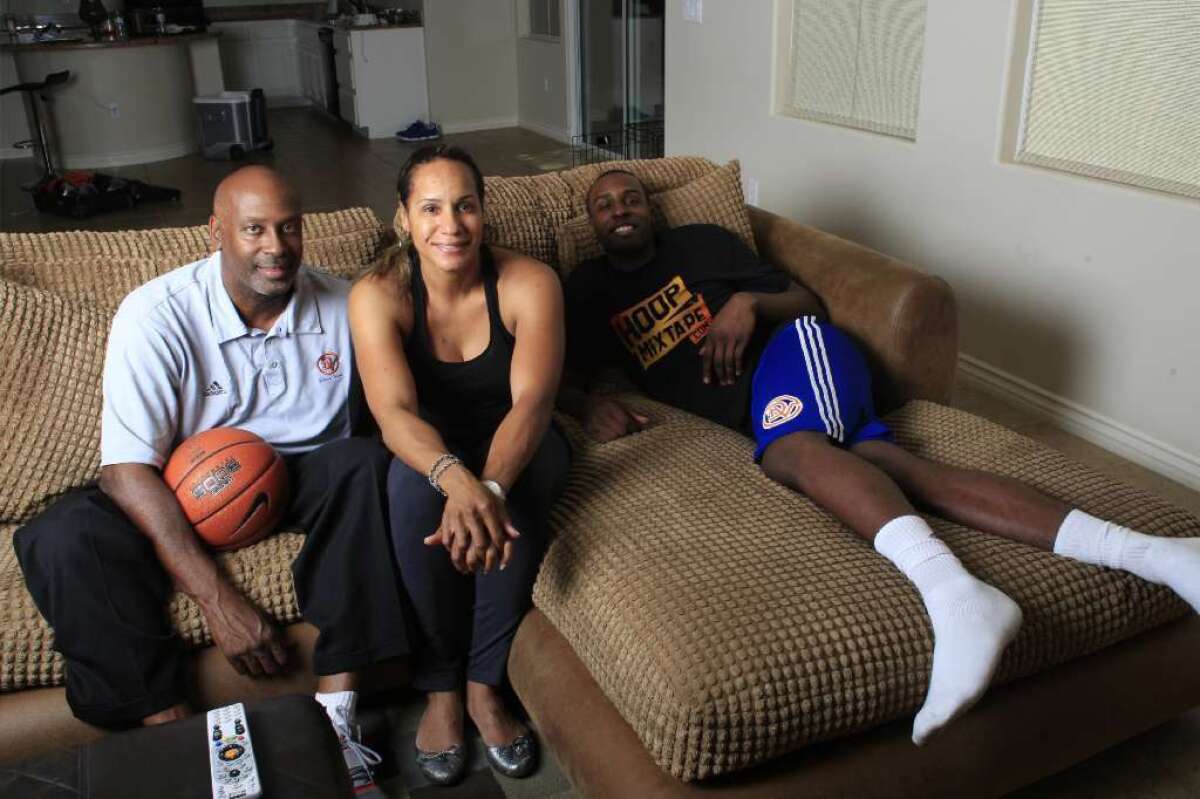When athletes get tripped up by Mom and Dad

- Share via
Somewhere, lost in the sleaze that all so often defines what college basketball has become, are the overlooked culprits. Mom and Dad.
We in the media rant on and on about AAU coaches and summer leagues and slimeball agents (is that redundant?). We harp on coaches who cheat to get the blue-chip player and college administrators who look the other way.
We make fun of the NCAA because it is so big and pompous and obtuse and full of itself and makes so much money off the pimpled backs of teenagers. Plus, it is an easy target, kind of like coming out against cancer. We know the NCAA is a bureaucratic stink bomb. We just can’t get close enough to be sure exactly where the stench is coming from.
We even focus on the kids, the players themselves, although we tread more carefully there. We characterize them as pawns for the evil-intentioned, win-at-all-costs adults. But in so doing, we leave reputational scars that never go away.
Some of that is deserved. Ignoring it would be a bigger sin. Did O.J. Mayo come to USC to study physics? Was Shabazz Muhammad attracted to UCLA’s fine-arts program?
Every two or three years now, we will have an NCAA title run from a group of Kentucky hired guns. Enough titles and they can change their team name to the won-and-dones.
But are these 18- and 19-year-old jump shooters the real essence of the problem? Are all of the aforementioned?
How about Mom and Dad? The phrase “father knows best” was a TV show title, not an accurate assessment of the parental role in the life of many young athletes these days.
We had the recent news of Muhammad’s father, Ron Holmes, being sentenced to 37 months in prison for real estate fraud in Las Vegas. His money issues seemed connected to loans secured on the basis of the future NBA earnings of his son.
Then last week, we heard from former agent Noah Lookofsky about the thousands of dollars he said he gave to former Bruins player Tyler Honeycutt so he could secure his spot as Honeycutt’s agent when he went pro. Woven throughout Lookofsky’s statements to SB Nation and later The Times was the depiction of pressure from Honeycutt’s mother, Lisa Stazel, for money.
Rent money, travel money, money to buy a car. She could have been a stand-in for Cuba Gooding Jr. in the movie “Jerry Maguire.” Show her the money.
College football can be just as rotten. How about Reggie Bush’s parents?
How much long-range damage was caused to USC over their cash calls? How about the damage to their son, who now gets to live under the cloud they created for at least the rest of his athletic life, and probably well beyond? Is the first thought in a word association with Reggie Bush (1) superstar athlete or (2) cheater? Why doesn’t anybody question what they did to Reggie, rather than what Reggie did to USC and college sports? Who were the adults there?
What might Todd Marinovich have achieved had he not eventually caved to the pressures of being bred, groomed and driven to an athletic level sought by his father?
Might Kevin Love have enjoyed at least one more year at UCLA, where he seemed to embrace campus life, had not his father been in a rush for his son to be a pro?
Certainly, money corrupts. But it should not corrupt the most important thing a parent does, which is raising a child correctly. You can’t buy that. A big NBA contract can’t provide that. Parents need to support their children, not vice versa.
Go to their games. Encourage their ambitions. Let the coaches coach, the teachers teach and the parents be the source of their real values.
One of the best and most meaningful quotes ever uttered by an athlete, and cited often in this space, was years ago, when tennis star Pam Shriver was talking about newcomer Lindsay Davenport. Shriver said, “I have never met her parents, and I love them for it.”
In the world of pro sports, Davenport was stunningly normal. Apparently stunningly well-raised too. She once skipped a big tennis tournament so she could stay home and go to her high school prom.
Many years ago, just after peach baskets were replaced with rims, there was a high school basketball player whose father’s name was George Dwyre.
George didn’t know basketball from basket weaving. Growing up, he had no time for sports. There were always cows to milk. “Cows never go on vacation,” he used to say.
So when his son played in games, George would always come, sit off to the side, never say much, always be supportive and simply be there so his son knew he was.
After one particularly horrid performance — turnovers, fouls, missed free throws late in the game — George was waiting in the hallway afterward. His son fumed about referees and bad bounces. To which George responded, very quietly, that he had noticed that the other team was taller and had better shooters.
There were no NBA contracts forthcoming, no college basketball scholarships. Nor were any needed. This kind of parental life lesson was priceless.
More to Read
Go beyond the scoreboard
Get the latest on L.A.'s teams in the daily Sports Report newsletter.
You may occasionally receive promotional content from the Los Angeles Times.











